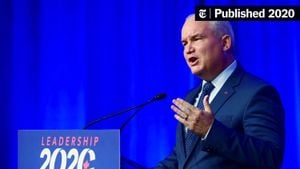Recent developments within the U.S. political scene have stirred significant conversation among politicians, celebrities, and the general public alike. Tensions are rising, particularly with the incoming administration and its shifting policies, setting the stage for some noteworthy debates and controversies.
One of the most talked-about incidents involves Chris Cuomo. The former CNN anchor, who made headlines for his controversial firing from the network, continues to vocalize his thoughts on the situation. During his latest interviews, he expressed his hurt over his termination, underscoring his position of always intending to support his family. Cuomo stated, "You only live going forward, and CNN is part of my past," remarking on his transition from the network to his new role at News Nation. Despite his aim to move forward, he couldn't help but reflect on past choices—especially his decision to assist his brother, Andrew Cuomo, through difficult times. Chris Cuomo commented, "I never kept any secrets about what I was doing. I’ll always help my family," illustrating the unwavering loyalty he feels.
Meanwhile, the high-stakes political game isn't limited to anchors and newsrooms. Billionaire entrepreneurs are also getting involved, with Elon Musk and Jeff Bezos trading barbs on social media. This peculiar rivalry highlights how influential figures engage publicly about political favorites, particularly surrounding the upcoming presidential race. Musk, previously known for his support of Donald Trump, alleged on X—the platform previously known as Twitter—that Bezos was discouraging people from investing in his companies, alluding to comments Bezos supposedly made about Trump's chances. Bezos quickly rebutted, tweeting, "Nope. 100% not true." This exchange not only reflects their individual corporate interests but also the broader discourse about politics among America’s richest.
On the electoral front, Vice President Kamala Harris recently faced backlash following her decision to take time off for vacation after the Democratic party experienced electoral losses. Her absence came at a time when Democrats are rushing to push through President Joe Biden’s judicial nominees, which could be pivotal for party control as the Senate gears up for potential Republican dominance. Critics were quick to question her priorities, especially as her trip came on the heels of significant political losses.
Adding to the drama, Senator Rand Paul has also emerged as a voice of dissent within the Republican party. Criticizing the use of military forces for deporting undocumented immigrants, Paul deemed it "a huge mistake," indicating his concern about the negative image it would project for the party. His comments are representative of the internal discussions occurring within GOP circles, where there's increasing concern about how extreme positions might affect the party's image going forward.
Bill Nye, well-known for his science advocacy, also entered the fray by openly criticizing Robert F. Kennedy Jr. as Trump’s pick for the Department of Health and Human Services, stating Kennedy has "lost his way." This comment underlines the intersection of science, health policy, and political allegiances, showcasing how figures from outside traditional political spheres are weighing in on important appointments.
The tension between Washington politics and the entertainment world hasn’t gone unnoticed, especially with Whoopi Goldberg making headlines as her favorite cake made its way to Capitol Hill, highlighting the sometimes frivolous aspects of political life contrasted against serious legislative actions. Representative Nicole Malliotakis joined the buzz by attempting to get involved with the cake's appearance following Goldberg's feud with local bakery owners. This whimsical moment contrasts sharply with the pressing political matters at hand and reflects how culture and politics often intermingle.
The International Criminal Court also made headlines by issuing arrest warrants for prominent figures, including Israel's Prime Minister Benjamin Netanyahu. Such actions signify the growing scrutiny international leaders face concerning their governmental decisions, especially during tumultuous times like the recent Israeli-Hamas conflict.
Returning to domestic matters, the public's reaction to political maneuvers remains pivotal. Nearly half of American voters feel disillusioned with the two-party system. Many voters are seeking alternatives, indicating potential challenges for both Democrats and Republicans as the 2024 elections approach. This sentiment of disenfranchisement has fueled discussions about how candidates can appeal to the ever-changing electorate.
The current political strategies adopted by various parties hint at the shifts they may face, especially with the nation growing increasingly polarized. With lawmakers scrambling to solidify their bases and engage disillusioned voters, the upcoming months promise intense campaigning and strategic maneuvering.
Overall, the intertwining of celebrity and political commentary encapsulates the contemporary American narrative—where media, politics, and personal loyalties collide. The public is watching closely as these stories evolve, eager to see the impact they will have on upcoming elections.



